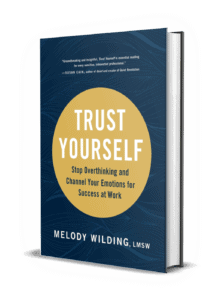“You’re too sensitive.”
“You need a thicker skin.”
“Quit taking things so personally.”
“Stop overreacting.”
Do these sound like things you’ve heard before?
If so, it’s understandable that you may have come to view your emotionality as a liability instead of the gift that it is. After decades of being told they are thin skinned, many Sensitive Strivers eventually conclude that their emotions are excessive, invalid, or wrong, when in fact they are having a genuine emotional response that feels natural to them.
Angela, a client of mine, once summed up the pressure, saying, “Sometimes I wish I could ratchet down my own intensity. I want to project an image of being calm and in control, but on the inside, I feel anything but serene. What is wrong with me? I wish there was an off switch for feeling and caring so much about everyone and everything.”
Like Angela, many of my clients have wondered why they cry when moved by a kind gesture or agonize when a friend uses a period instead of an exclamation point in a text message (does she hate me?), not realizing their innate sensitivity is the source.
Are You “Too Sensitive?”
From a young age, you may have been told to “snap out of it already,” “buck up,” or “just shrug it off” when you experienced disappointments like losing a race or getting a B on a test (which is equal to failure to perfectionistic Sensitive Strivers). Maybe you were told to “calm down” and “chill out” even when you experienced happiness and joy because it was more intense than that of other people.
Now as an adult, you may still find yourself worked up (sometimes debilitatingly so) by scenarios that other people find moderately stimulating, especially when stress and expectations are high. During these times, you might want to get rid of unwanted feelings like sadness, anger, shame, or guilt like Angela did.
But fighting your feelings doesn’t work. It’s like trying to hold a beach ball underwater. It comes back up and smacks you in the face as soon as you remove some pressure.
While your emotional reactivity might feel like a hindrance, it’s important to understand that your emotions serve a critical purpose. This can help you reframe how you respond and appreciate them as the powerful tools they are.
The truth is that your emotions are messengers. They give us important information about our needs or actions we can take. They are signals that indicate what’s important to you. They’re a valuable source of intelligence and insight.
How to Listen to Your Emotions
Here’s a look at some common negative emotions we tend to feel at work and new ways to look at their value.
Anger
Anger can be a sign that a value or standard that is important to you has been violated. It indicates that you have passion to fight for something.
Questions to ask yourself:
- How can I communicate why this is important to me?
- What boundary needs to be set?
Frustration
Frustration can be a sign that we need to be more flexible with our approach because what we’re trying now is not working.
Questions to ask yourself:
- What other possibilities exist?
- How can I be more flexible?
Inadequacy
Inadequacy suggests that there’s a gap between your perceived skill level and the one required to be successful.
Questions to ask yourself:
- How true is it that I lack expertise?
- What can I learn from past accomplishments?
Overwhelm
Overwhelm signals your priorities are not in order that your energy is being spread too thin. It presents an opportunity to re-evaluate how you’re spending your time so you can feel more in control
Questions to ask yourself:
- What’s the most important thing to focus on?
- What is in my control?
Loneliness
Loneliness is a call for connection.
Questions to ask yourself:
- Who encourages me?
- What kind of connection do I need?
Chances are, in the past when you felt one of these emotions, you tried to squelch it. But now that you know that’s not helpful— and can actually backfire— I want to encourage you to ask yourself better questions instead. Investigate, “What is this emotion trying to tell me? What message is it offering?”
Rather than thinking about your emotions as something to get rid of or control, think of them as something to understand and mine for data so you can respond to situations in more empowering ways.









